- Home
- Aaron Polson
The Bottom Feeders and Other Stories Page 4
The Bottom Feeders and Other Stories Read online
Page 4
“Look at it. Must’ve messed somebody’s car up pretty good, by the looks of that.” The Sheriff turned and followed Benny inside the café. I stood for a moment, taking in the image of the mauled animal, and imagining the monstrous car that could do that kind of damage.
The rain started again, heavy floods from the iron sky. I sat in my booth at Pine Peak, munching on some burnt bacon and digesting a few short stories from my new textbooks for the fall. Randy perched on his usual stool with no sign of Pete or Manny.
“I don’t much mind the rain today,” Randy muttered to Darla. “Too many of those damn bugs.”
I closed my book, and turned my head slightly toward the counter, enticed by the word “bugs”.
“You’ve just been workin’ too hard,” Darla said, smiling. “Trying to make up for lost time with the weather.”
Randy tugged hard on his beard and said, “No. No, there’s something out there.” He wagged one rough finger toward the café windows. “Them bugs. They’re getting bigger.”
“Nonsense.” Darla chuckled—she wasn’t the kind of woman who giggled.
“Hell, I’m telling the truth. Old Lumpy came running out of the trees last Thursday evening, tail tucked between his legs. I started laughing at him, they way he looked all scared—I figured he pissed off a marmot or something. Anyway, this big son-of-a-bitch comes scurrying after him. Craziest thing, watching this beetle the size of that old hound come scurrying out of the forest.” Randy’s voice became a little distant. “The damn thing scrambled right over a downed tree, straight at me. I dropped the chainsaw right on it.” His coffee cup made a noisy clink when it hit the saucer.
“I think the only thing you’ve been dropping is a little too much of the old Kentucky vintage, if you get my meaning,” Darla said as she turned back to the counter and replaced the coffee pot on its warming plate.
“Randy?” I asked, standing now just a few feet from the counter. “Was anybody else out there with you?”
“Hell no. Pete and Manny totally turned on me. Won’t go out after talking to that kid—Lane. Shit, I’m not going back until I’m sure those damn bugs are gone.”
“I think you should call the sheriff. I mean if you _really_ saw something that big…”
Randy stood up, stretching all six feet of his barrel chest in front of me. “You think it’s the booze too, huh?” He pushed past me and exited the café.
I finished my meal in silence, walked home under a black umbrella against the rain, and called Lane.
“Hello?”
“Yeah, Lane. It’s me Rick.”
“Hey Mr. Grinnich.” The kid still called me Mr. Ginnich even though he graduated three years ago. “I called my advisor. He was out of the office for the summer session, but I left a message and emailed him some digital pics of the beetle.”
“That’s what I’m calling about. Randy was down at Pine Peaks today, and he claimed he saw another beetle. He said it was bigger and alive.”
“Really? They couldn’t get much bigger. The ecosystem just couldn’t support them.”
“Randy does have a bit of a whisky problem, but that wouldn’t make him hallucinate…”
“What time of day was it?”
“I don’t know—wait he said ‘evening’. I know he’s been working late, trying to make up lost time because of the rain. That and his workers have chickened out on him.”
Lane’s voice grew distant for a moment, like he spoke away from the receiver. “That would make sense, most species of Carabidae are nocturnal…Listen, I’m going to call Randy, see if I can go out with him tomorrow.”
“If it stops raining.”
“Of course. I want to see these things myself.”
After a slight bribe—a fifth of Jack Daniels, Randy agreed to drive Lane out to the woods. Lane called that night and explained the deal, and I waved them the next morning as they drove west on Kimberly-Long Creek Highway. It was early on Tuesday, and I jogged around town, my usual workout. Something floated in the air that day, something quiet and watchful. The trees seemed closer, pressing in on the edges of Monument, swelling the town to some breaking point. After the jog, I ate my breakfast at Pine Peaks and spent a good part of the morning camped at the booth in the corner. Darla seemed a little distant that morning—distant and brooding.
Sheriff Kress came in around ten. “Mornin’ Darla.” He turned to me and nodded. “Mornin’ Professor.”
“Black?” Darla asked.
“Sure.” He settled onto one of the stools at the bar.
“Busy morning?” she asked while pouring the coffee.
“Not so much. A couple of calls on dogs.”
“Strays?”
“No. Old Elmer Nowlan’s mutt got torn up by something. Probably just some over-aggressive raccoons, but it was a bit of a mess. The Hernandez family can’t find their dog—that old German Shepard…Zeb.”
Something clicked. “Sheriff,” I said while standing and walking toward the counter, “did Randy Crouse ever report anything strange to you? Call you about some large insects?”
“Bugs? No.” He sipped his coffee. “What would I have to do with bugs?”
“These are big. We brought one to Albricht’s place, had Lane take a look.”
“Randy hasn’t said anything to me. How big is big.”
I sat down on a stool next to the sheriff. “The one I saw was about the size of a shoe.” I held my hands up for a visual aid. “Randy claims to have seen larger specimens out in the woods.”
“Randy has claimed a lot of strange things over the years.” He stood, dropped a few coins on the counter, and patted me on the back. “I wouldn’t worry about it too much, Professor. Thanks Darla.” He strode from the café, climbed into his truck, and pulled away.
Early that evening, the quiet seemed to swell and fill the little clearing occupied by our town. I sat on my porch, trying to enjoy the end to a rare, cloudless day. It was the sort of day I’d moved to Oregon to find, the sweet pine smell, the buzzing aliveness from all the trees and close wildlife, but I felt anxious. I had been nervous since Randy and Lane left that morning.
I was startled by the shots—not the first time I’d heard distant gunfire, but this series of pops pushed all the blood from my veins for some reason. The sound came from Deer Creek Road, echoing through the valley to the east. I hurried down the hill toward Main Street, knowing that the sheriff would be there if he was in town.
Darla stood on the sidewalk wiping her hands on her apron. A few other townspeople, maybe a dozen, stood around in the gathering twilight, mumbling about the gunfire. Pete and Manny were there, by each other’s side as usual. Nancy Albricht, Lane’s mom, held a cell phone to her ear, pacing a small segment of walk just down the street from the café.
“What’s happened?” I asked Darla.
“Don’t know. I just heard the shots. Nancy’s worried, trying to call Lane.”
A slight pop sounded in the distance, and the lights flickered and went black inside the café. Darla rushed inside. The sun started to slip past the crooked lip of trees in the west, and a punishing silence crawled into Monument. A brooding silence.
“I got Lane. They’re on their way back.” Nancy crushed the silence with her nervous voice as she hurried into the small throng of people.
Darla stepped out of the café. “We aren’t just without power. The phone’s gone too.”
The sun completely disappeared behind the pine trees on the horizon, dropping night’s heavy blanket on Monument. I thought about walking back to my house up the hill, but the dark streets worked against me. I felt safer in the group of people. Clouds started to roll over the little piece of yellow moon in the sky. My stomach tightened. I looked at Nancy. “I think you should try the sheriff on your cell phone.”
Before she responded, someone in the group asked, “What’s that?” Everyone stopped breathing for a moment, listening to the shadows all around. A small scrabbling sound, like twigs scratching against a
sphalt and concrete, crawled toward town from the east. I turned to look, just missing the headlights as they rounded the curve behind me.
“Lane!” Nancy hollered, hurrying to Randy’s truck. The small gathering was blown bright from Randy’s headlights, and most looked pale and unnatural under the beams.
“Mom, look, what’s everybody standing around for?” Lane asked as he hopped down from the passenger seat. “You look like you’ve all seen a ghost.”
Nancy hugged her son.
“Awww, Mom…” Lane pushed away.
“Did you find anything today? Any more beetles?” I asked, moving closer to Lane.
He rubbed his blonde hair. “Yeah, but Randy couldn’t find the big one that he went Texas Chainsaw Massacre on the other day. All we found were shells, like the beetles had been molting…growing. Like the cicadas. A bunch of them. But no live ones.”
The crawling sound grew louder, just underneath our voices, a scratching from the shadows. I looked at Nancy again, “I think we better call the sheriff.” She nodded and started punching numbers on her phone. Feet shuffled on the pavement, a small gathering of nervous movement.
Randy climbed from his truck, engine running and lights still shining. Another set of headlights swerved down Main Street from the south. “Sheriff Kress!” Randy shouted, recognizing the police vehicle. Those lights clicked off, and Benny stumbled out of the driver’s door. Illuminated by Randy’s lights, I could see his face was ashen and dotted with dark spots. He held one arm close to his side, a dark streak spreading down his hand. In his injured arm he carried a shotgun.
“Get out, all of you! Load up and get the hell outta here!” He took the bloody hand from his arm and waved it wildly at the small crowd.
“Where’s the Sheriff?”
“Dead…shit…he’s dead. They were everywhere—those goddamn bugs—coming this way. Sheriff stood there, point blank, and unloaded his twelve-gauge. They didn’t flinch. Get the hell out.”
There was a singular moment of silence, and then the handful of citizens in front of Pine Peaks Café started in separate directions, slowly at first. That sound, that scratching, moving sound, grew louder, surrounding and swallowing us. Movement hovered just outside the light, and at the edge of my vision I saw small legs like black bamboo and probing antenna fingers.
Benny hit the pavement with a wet smack. His shotgun dropped to the ground, skidding toward my feet with the force of the blow. A beetle, an abomination the size of a desk, perched on his back, locked its awful pincers around Benny’s head, and twisted with a quick, wet snap and spurting gout of blood. Then the thing started on his body, scratching and snatching with its nightmare jaws.
Randy shoved me aside, and grabbed the shotgun. At the edge of the headlight beam, I could make out the black, moving legs of many more beetles. Randy took quick aim at the beast on Benny’s body, and fired into its mass.
“The light…they’re nocturnal! Stay in the light!” Lane yelled. It was too late. The headlights yanked away, and I turned just in time to see a shadow of Pete’s terrified face behind the windshield of Randy’s truck. With a quick turn and jerk, he pulled a U-turn on Main Street, heading north toward the old highway. The moon poked out from a little cloud, and I saw the shining black carapaces of a half-dozen beetles as they latched on to the vehicle. The street all around swam with the shimmering shells of the devil beetles as they swallowed the town, their little skittering feet chasing the soft padding of shoes on pavement.
Randy fired again, and I just caught a glimpse of a black monster rise up in his muzzle flash. Darla shouted, “Get inside!” Temporarily blinded by the shot, I stumbled toward the café. I pushed past her as she held the door open, the sounds of screams and frightened shouts at my heels. Glancing over my shoulder, I saw nothing but black on the street. With the moon gone, the beetles became invisible, just a scratching and snapping mass of black.
Choking on my burst heart and sucking in air to cool my terror, I climbed over the counter and pushed into the kitchen. The glass windows broke behind me with a thunderous crash. Darla screamed. Needing a hiding place, any place, I felt for the door of the large baking oven, the oven used last when Pine Peaks baked its own bread. I threw it open, yanked out the baking rack, and scrambled inside, pulling the door shut behind me. I hid in that oven all night, cramped and crying in darkness and sweat, listening to the muffled shouts of the townspeople—the screams that echoed into my oven tomb, horrible shrieks that slipped through the cracks in the heavy iron door. The screams faded to moans, and soon I was lost to nothing but the constant scuttling and scrabbling of antennae and legs as the unreal beetles swarmed through the wreckage of the café.
In the morning, after the world fell silent, I climbed out of that oven covered in soot and grease. Little bits of glass and broken furniture crunched as I crawled toward the smashed front of the café. Outside, the forest listened. Surely those awful beetles waited in the darkness under the pine boughs, waited for the night when they would move on.
I found no bodies on Main Street—nothing but broken glass and small bunches of debris washed into little piles by overnight rain. I walked through the dead streets, meandering toward my house, my car. Lumpy, his hair matted and wet, crawled from under a parked truck, sniffing my hand and wagging his tail weakly. That plague of awful, black horrors seemed to have devoured the rest of Monument. When I reached my house, I would call, warn anyone who would listen about the plague, and then load Lumpy in my car and escape that valley while the sun offered protection.
5: Care and Feeding of the Old Flat Mile
I
Some places were just born evil, and the Old Flat Mile slid easily into that description. Constructed shortly after the Second World War, that stretch of road was originally intended for glory. Architects and businessmen pointed to what they dubbed the “Golden Mile” as the linchpin in Springdale’s future rise to prominence. The luxuriant homes built there were sure to draw investors with the deepest of pockets. That was the plan until little Calvin Unruh was crushed under the tracks of a bulldozer while chasing his brother’s errant throw.
Construction halted immediately, investors clambered for their money, and the proposed housing development disappeared like a summer mirage. The county took over the road, dubbed it North 1800, and left it unpaved. The locals christened North 1800 “Flat Mile,” surely with no pun aimed at poor Calvin’s unfortunate accident.
Meanwhile, Calvin’s older brother, Daniel, lived with the knowledge that he threw the football his brother chased that day. He spent many years as a haunted, pale boy with black eyes. And as Daniel grew up, the road waited.
In time, Daniel’s guilt faded. Especially after he eased into his teen years and developed a penchant for tinkering with engines and blondes. Some said he tried to forget his brother with those fast cars and girls, and maybe they were right.
Daniel loved to drag race, and the level stretch of the Flat Mile was the perfect spot to flex his automotive muscle. There were other times, quieter evenings with full moons, during which he would ease his ’57 Chevy down that road to put his girlfriend in the mood.
On one of those nights built for romance, he steered onto the Flat Mile only to find his buddy, Jeb Harwood, waiting in his own hot rod, itching for a race. Something in the rumble of those two cars must’ve woken the road; it had tasted blood once, and its hunger must’ve grown.
Daniel ended up losing control on a patch of loose gravel, and the race concluded with his’57 wrenched around a tree. His girlfriend survived, eventually moving to Kansas City, marrying, and raising three children. Daniel, however, never really left the Flat Mile.
Unfortunately, Daniel wasn’t the last to smear his young blood in the dirt and sand. Teenage boys, full of hot blood, loved to prove their mettle with fast, reckless driving. After a few more fatalities, city officials blocked off the Flat Mile, and the road was left in loneliness and disrepair.
Over the next forty years, stories faded,
signs were taken down, and the road slept. Eventually, a new generation of Springdale teens found a use for North 1800.
II
Oblivious to history, Jimmy Campbell, tried to navigate his father’s Chrysler through the thick April mud of the Old Flat Mile while his girlfriend, homecoming runner-up Maggie Bloch, complained. Beneath them, the road smelled engine exhaust, purred with the sweet rumble of a straining engine, woke, and called its children home.
“What the hell were you thinking, Jimbo?” Maggie asked. Her long fingernails carved deep into the smooth faux velvet bench seat as the car groaned, its wheels spinning in place.
Jimmy’s beefy paws clutched the steering wheel, gripping so tight that his knuckles turned white. “Look, I figured it hadn’t rained in a couple days, so it’d be okay.”
“Well, a couple of dry days don’t matter much when it rains for a week straight.” Jimmy ran a handful of stubby fingers through his sawed-off brown hair. “Hell, I thought the full moon would be nice.”
Maggie wasn’t ready to play nice. “Real romantic,” she said, glancing out the window and catching a ghost of her own, thin-faced reflection in the glass. “It isn’t even a full moon.”
“Like hell.” Jimmy released his foot from the gas, and the car sighed with relief. He pushed his face against the windshield and searched for the moon.
“No, it’s only about three-quarters.”
“Awww,” Jimmy moaned, dropping his head to the steering wheel. “I wanted to, you know, do something you might think was romantic.” His hands dropped to his chin. “I really fucked up. If the Charger was ready, we wouldn’t be stuck.”
Maggie’s face broke into a smile. “You think your dad’s old clunker could get us out of this mud pit?”
Jimmy’s face sprouted with red blotches. “First of all, it’s a ’69. A classic, not a clunker. And no it couldn’t get us out of the mud. Once I get that puppy humming, I’m not taking it out in this stuff, anyway. If the road was dry, hell yeah. I can’t wait to—”

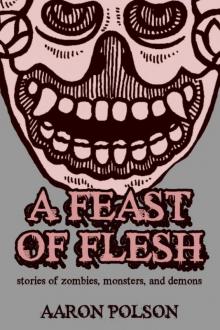 A Feast of Flesh: Tales of Zombies, Monsters, and Demons
A Feast of Flesh: Tales of Zombies, Monsters, and Demons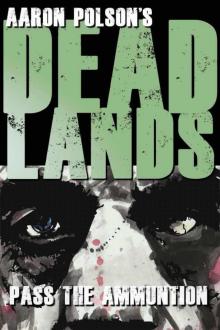 Dead Lands Pass the Ammunition
Dead Lands Pass the Ammunition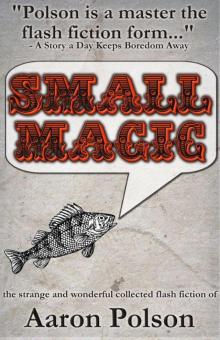 Small Magic Collected Short Stories
Small Magic Collected Short Stories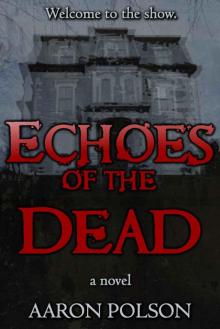 Echoes of the Dead
Echoes of the Dead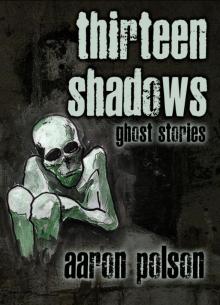 Thirteen Shadows: Ghost Stories
Thirteen Shadows: Ghost Stories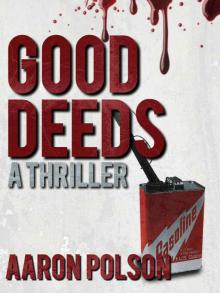 Good Deeds: A Thriller
Good Deeds: A Thriller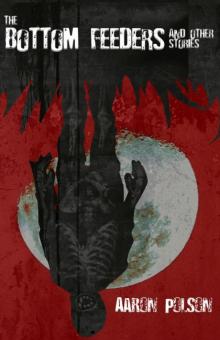 The Bottom Feeders and Other Stories
The Bottom Feeders and Other Stories